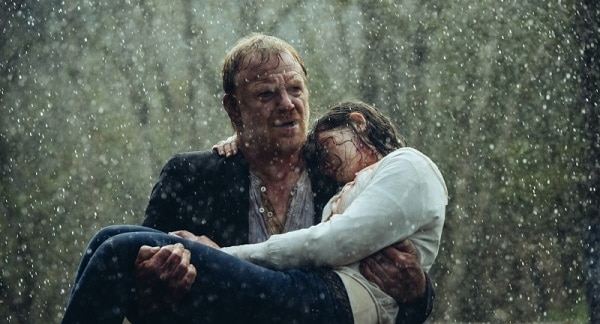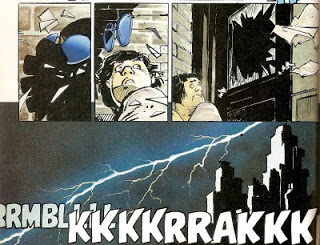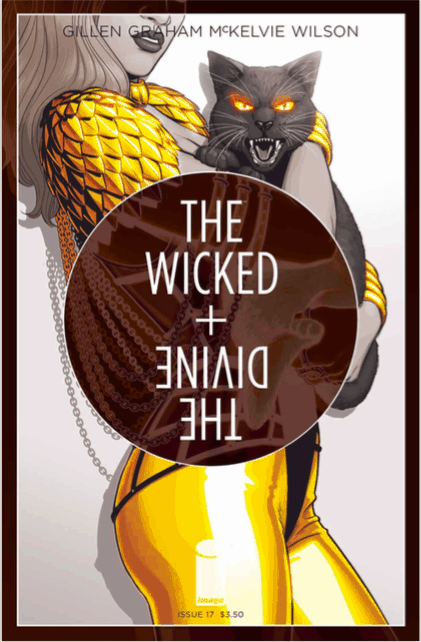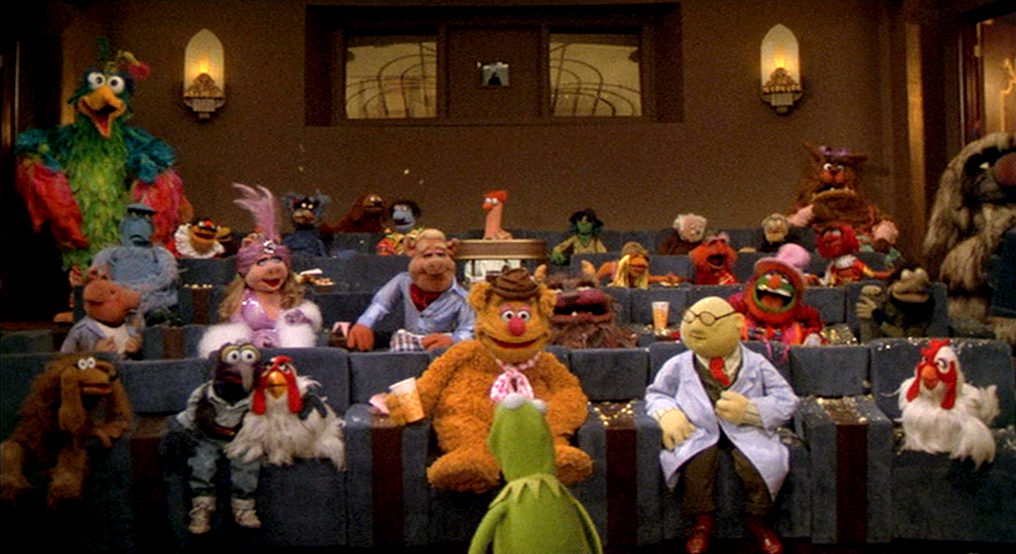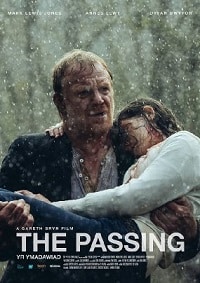 The Passing
The Passing
Written by Ed Talfan
Directed by Gareth Bryn
UK, 2015
The Passing unfolds like a nightmare masquerading as a beautiful dream. The startling debut of Welsh director Gareth Bryn conceals all of its ugly secrets until escape is no longer an option. Its languid pacing and rustic beauty build an almost unbearable tension that threatens to explode at any moment. Ultimately, The Passing is a masterstroke of allegory and mood that continues to haunt long after it’s over.
Stanley (Mark Lewis Jones) lives alone. He’s always lived alone. The curtains in his dilapidated house whip in the cold country wind, and electricity is a luxury that never penetrated this desolate wilderness. Every day this hulking, gentle man toils in his deep well, shoveling mud into a bucket and hoisting it to the surface. At night he reminisces over his carefully-preserved family photos and the carved animal figurines loading into a toy replica of Noah’s Ark. Indeed, The Passing is laden with watery symbolism.
 It seems only appropriate, then, that Stanley’s world is changed forever when he discovers a crashed car in the nearby river. He bravely plucks an unconscious young woman named Sara (Annes Elwy) from the wreckage, her agitated boyfriend Iwan (Dyfan Dwyfor) trotting close behind. As Sara regains her strength, she forges an unusual bond with the mono-syllabic Stanley, coaxing long-dormant feelings and secrets from his protected depths. These affections don’t sit well with Iwan, who grows increasingly angry and erratic in these isolated environs. And all the time there is an invisible presence; something horrible that doesn’t need teeth or claws to destroy its victims.
It seems only appropriate, then, that Stanley’s world is changed forever when he discovers a crashed car in the nearby river. He bravely plucks an unconscious young woman named Sara (Annes Elwy) from the wreckage, her agitated boyfriend Iwan (Dyfan Dwyfor) trotting close behind. As Sara regains her strength, she forges an unusual bond with the mono-syllabic Stanley, coaxing long-dormant feelings and secrets from his protected depths. These affections don’t sit well with Iwan, who grows increasingly angry and erratic in these isolated environs. And all the time there is an invisible presence; something horrible that doesn’t need teeth or claws to destroy its victims.
Director Bryn frames his film like an old painting, with forlorn structures and dense wilderness. Yet, when we look closer at the canvas, we see nothing but detritus. All of the trees are tumbled and rotten, and the buildings are weather-beaten or half-demolished. When Sara snoops through the cabinets and corridors of Stanley’s house, she finds nothing but faded mementos of the past. Time has long-ceased moving forward in this place, trapping anyone unlucky enough to cross its path. Unlike most psychological dramas, Stanley isn’t upset over Sara’s brazen trespasses. He’s eager to share the darkness with her. Thanks to Bryn’s bravura direction, this is a painting that keeps smearing the colors together and re-shaping our expectations.
 To reveal any secrets from The Passing would be a crime. Screenwriter Ed Talfan has constructed a clever maze that doesn’t feel like a trap until you’ve used the last bread crumb. It builds dread slowly, like the precious commodity that it is. Each time Stanley and Iwan descend into the well, the less guarded they become with their hostilities. Sara’s haunting visions insinuate themselves deeper and deeper into her fragile reality. Every meeting between the three housemates grows more fraught with sexual subtext. Trapped in the middle of nowhere, the tension has no recourse but to burrow inside each character.
To reveal any secrets from The Passing would be a crime. Screenwriter Ed Talfan has constructed a clever maze that doesn’t feel like a trap until you’ve used the last bread crumb. It builds dread slowly, like the precious commodity that it is. Each time Stanley and Iwan descend into the well, the less guarded they become with their hostilities. Sara’s haunting visions insinuate themselves deeper and deeper into her fragile reality. Every meeting between the three housemates grows more fraught with sexual subtext. Trapped in the middle of nowhere, the tension has no recourse but to burrow inside each character.
The performances are first rate. Mark Lewis Jones manages the difficult task of keeping Stanley vulnerable and threatening at the same time. His serenity may be legitimate or a complete façade. Annes Elwy is a revelation as Sara. She is so brave and fearless with Stanley; providing a new set of shoulders upon which he can unload his burden. In her own life, particularly her troubled relationship with Iwan, she struggles to find that same strength. Elwy shifts effortless between martyr and aggressor. In what is, essentially, a three person stage play, each actor finds their own space while still giving selflessly to their co-stars.
 Though not a horror film in the strictest sense, the lush imagery and laden atmosphere of The Passing make it no less foreboding. Perhaps some of the pieces don’t quite fit together upon closer inspection, but the visceral experience more than compensates for any plot holes. The musical score by Jeremy Holland-Smith is also one the year’s best, and a key conspirator in establishing the overriding claustrophobia.
Though not a horror film in the strictest sense, the lush imagery and laden atmosphere of The Passing make it no less foreboding. Perhaps some of the pieces don’t quite fit together upon closer inspection, but the visceral experience more than compensates for any plot holes. The musical score by Jeremy Holland-Smith is also one the year’s best, and a key conspirator in establishing the overriding claustrophobia.
Ultimately, The Passing is a psychological drama that is perfectly content to let you swim in its ambiguities. Beautifully photographed and meticulously paced, this is the assured work of a promising first-time filmmaker. It neither smothers with its ambitious themes, nor draws attention to its dynamic visual stylings. It’s a thoughtful look at life, death, and family that never forgets to entertain along the way.
